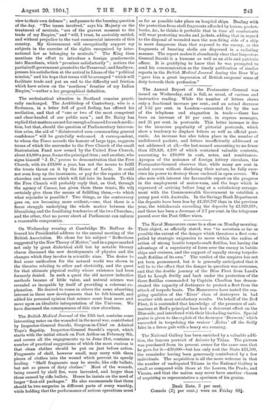The British Medical Journal of the 13th inst. contains some
interesting notes on the wounded in the naval war, contributed by Inspector-General Suzuki, Surgeon-in-Chief on Admiral Togo's flagship. Inspector-General Suzuki's report, which starts with the initial attack on Port Arthur on February 8th, and covers all the engagements up to June 21st, contains a number of practical suggestions of which the most curious is that clean clothes should be put on just before action. Fragments of shell, however small, may carry with them pieces of clothes into the wound which prevent its speedy healing. "Shell fragments may be sterile, like rifle bullets, but not so pieces of dirty clothes." Most of the wounds, being caused by shell fire, were lacerated, and larger than those caused by rifle bullets. Hence he insists on the need of larger "first-aid packages." He also recommends that there should be two surgeries in different parts of every warship, wl3ile holding that the performance of serious operations must
as far as possible take place on hospital ships. Dealing with the protection from shell fragments afforded by knives; pocket- books, &c., he thinks it probable that in time all combatants will wear protecting masks and jackets, adding that in regard to the disposal of wounded men the non-firing side of a ship is more dangerous than that exposed to the enemy, as the fragments of bursting shells are dispersed in a radiating manner. The report makes it abundantly clear that Inspector- General Suzuki is a humane as well as an able and patriotic officer. It is gratifying to know that he was prompted to send his communication as the timely publication of similar reports in the British Medical Journal during the Boer War "gave him a great impression of British surgeons' sense of duty towards their profession."


































 Previous page
Previous page